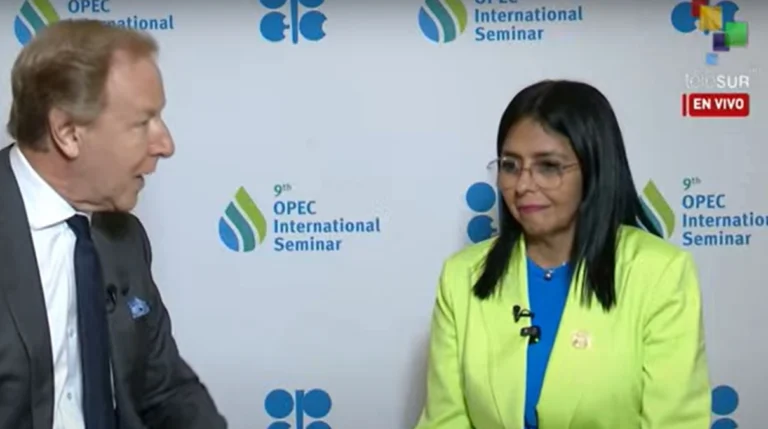Venezuelan VP Rodriguez Criticizes Sanctions on Oil-Producing Nations at OPEC Forum

Jorge Gestoso (L) and Venezuelan VP Delcy Rodriguez (R), Vienna, Austria, July 9, 2025. Photo: teleSUR
July 9, 2025 Hour: 1:04 pm
She placed the outlook for the global oil industry within the context of the energy transition and the U.S. geopolitical agenda.
On Wednesday, Venezuelan Vice President Delcy Rodriguez gave an exclusive interview to teleSUR from Vienna, where the Organization of the Petroleum Exporting Countries (OPEC) is holding its 9th international seminar under the theme “Towards a Sustainable and Inclusive Energy Future.”
RELATED:
The Energy Transition Should Not Put the Energy Trilemma at Risk: Rodriguez.
At the forum, Rodriguez placed the outlook for the global oil industry within the context of the energy transition and the geopolitical agendas of the United States and its allies.
“Twenty-six percent of global oil production is under unilateral coercive measures,” she said, referring to the situations in Libya, Iran and Venezuela.
Rodriguez, who also serves as Venezuela’s oil minister, additionally pointed out that 46% of the world’s oil reserves are also subject to what she described as a scheme of aggression. In that context, she said Venezuela is currently facing 1,041 such measures, describing them as part of an economic war against her country’s hydrocarbon industry aimed at reducing its competitiveness.
The Bolivarian official praised Venezuela’s achievements in rebuilding its oil industry and preparing to export its first molecule of gas by 2027, as well as in expanding cooperation with non-aligned countries.
“You cannot understand the energy transition without considering the geopolitical factor. Major producers and holders of reserves are subject to arbitrary sanctions. The world is at war, and economic warfare is one of its forms of expression,” she said, emphasizing that, in addition to harming the well-being of populations, this economic war complicates international investments.
“Looking ahead, investments in both renewable and fossil energy must be made with the goal of ensuring a balance in the energy trilemma,” she said.
“First, that balance means ensuring energy supply. Second, it must guarantee that supply is accessible to all people, because more than 2 billion people worldwide — mostly in the Global South — still cook with polluting fuels that harm their health. Third, the climate emergency must be taken into account,” Rodriguez added.
teleSUR/ JF
Source: teleSUR






